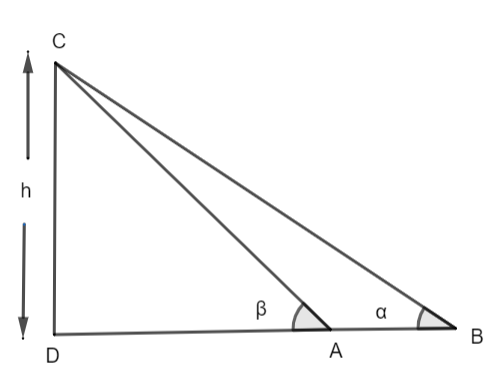Question
Question: From the top of a tower h metre high, the angle of depression of two objects, which are in the line ...
From the top of a tower h metre high, the angle of depression of two objects, which are in the line with the foot of the tower are α and β (β > α). Find the distance between the two objects.
Solution
Hint:We will use the concept of depression to draw the diagram and we will use the trigonometric angular formulas to find the required distance. One of the formulas that we will use here is given by tan(θ)=Baseperpendicular.
Complete step-by-step answer:

From the figure we get to know that CD represents the tower with height h meter. There are two depressions at point A and B. The angle CAD is angle β and angle CBD is the angle α.
Here, β > α in the figure.
Now, we will apply the formula of trigonometry to find the distance between A and B.
By the formula tan(θ)=Baseperpendicular we have tan(α)=BDCD and tan(β)=ADCD. As we know that CD = h meters.
Therefore, we have tan(α)=BDh and tan(β)=ADh.
Also, as BD = AD + BA.
Thus, we get tan(α)=AD+BAh and tan(β)=ADh.
Now, we will consider tan(α)=AD+BAh which actually results into (AD+BA)tan(α)=h...(i) and tan(β)=ADh results into ADtan(β)=h...(ii).
By substituting equation (i) and (ii) we get a new expression as,
(AD+BA)tan(α)=ADtan(β)⇒ADtan(α)+BAtan(α)=ADtan(β)⇒BAtan(α)=ADtan(β)−ADtan(α)⇒BA=tan(α)ADtan(β)−ADtan(α)...(iii)
By equation (ii) we get the value of AD=tan(β)h. Now, we will substitute this value in equation (iii).
Therefore we have
⇒BA=tan(α)ADtan(β)−ADtan(α)⇒BA=tan(α)AD(tan(β)−tan(α))⇒BA=(tan(β)h)tan(α)(tan(β)−tan(α))⇒BA=tan(α)tan(β)h(tan(β)−tan(α))
Hence, the distance between the two depressions A and B from the tower is BA=tan(α)tan(β)h(tan(β)−tan(α)).
Note: We could have also equated the value of h from equation (i). But this would have converted the simple solution into a complex one. In case we need to find out the value of the distance in terms of cot(θ) then, we would have used the substitution tan(θ)=cot(θ)1 in the answer and get the required new answer. But this is only when it is asked in the question.
